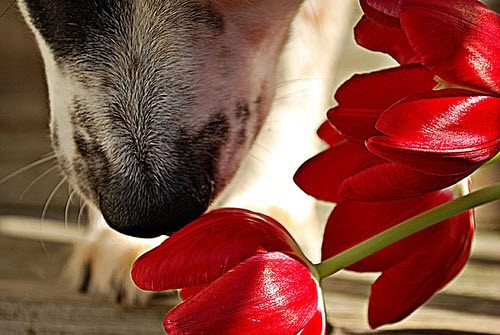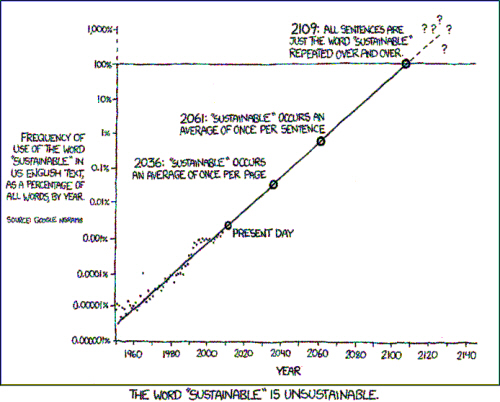Editor’s note: Over the years, I’ve been happy to publish updates on the work of former writer Caroline Savery and her Sust Enable Project. Here’s a recent post from the project’s blog on the nature of the work she’s been up to…
“Sustainability.” How many times have you already heard this word today?
It’s the kind of word you either love or loathe. Either “sustainability” is something you strongly resonate with, or the overuse of this word irks the piss out of you. When the word came into my consciousness several years ago, it was still a fairly fringe concept. Now, claims of “sustainability” are ubiquitous in our culture. Many people are annoyed with it. The main complaint I hear from fellow sustainability activists these days is “it’s not about sustaining something, it’s about thriving.” Word!
Indeed, the attractive power of a word. A word tries to capture something and transmit it; a word gets at a common experience. The word “sustainability” has an interesting history. Its modern application in connection with economic policy first occurred in 1967 at latest. According to Wikipedia, “The first use of the term “sustainable” in the modern sense was by the Club of Rome in March 1972 in its epoch-making report on the ‘Limits to Growth.” “Sustainability” continued to be applied to theories of economics and development, being propelled into the mainstream lexicon by the famous 1987 Bruntlandt Report, whose definition of sustainability as “meet[ing] the needs of the present without compromising the ability of future generations to meet their own needs,” is still the most popularly cited one today. Throughout the last two decades, “sustainability” has spiked dramatically in common use. The word today is hyper-proliferating to the point of near meaninglessness, as is illustrated by this comic.
Sustainability is an emergent concept in our modern times. One would surmise that the increasing popularity of this word corresponds to our expanding understanding of how human actions can substantially impact our environments. Whether or not you grok mega and meta issues like global warming and pollution, the effects of pesticides on pollinators and the impact of our oil spills on ecosystems, to cite just a couple examples, are undeniably linked to human industrial activities and have immediate unpleasant effects. The frenzied rate at which use of “sustainability” proliferates suggests our panicked urge to react to this devastating news. Sustainability is, perhaps, a trigger word, indicating a collapsing belief system and a desperate search for solutions to the apparent “unsustainability” of our economic and cultural systems.
Yet, intriguingly, such an abundant word doesn’t have a clear definition. Despite its Latin roots, Emrgnc has identified over 100 different definitions of sustainability. Given the high stakes and enormous tensions we’re enduring as we debate about how best to achievesustainability, it’s little wonder we cannot even agree on terms. So what does sustainabilityreally mean?
“Sussing out,” which is English slang, means “to infer or discover; to figure out” or “to size up; study,” according to The Free Dictionary. I like this term because it suggests “sniffing out” to me, like a dog curiously investigating a new encounter. We rightfully ought to be skeptical when examining claims of sustainability. Because of its amorphousness, anyone can use “sustainability” to justify any kind of action–including blanketing what they were already doing to look more “green.” In our modern world where billions of corporate dollars are spent on massaging your perceptions through advertising media, it’s a piece of cake to claim sustainability—but it’s much harder to do sustainability, since the latter involves overhauling entrenched systems. If the corporate chanting of “green” doesn’t invoke widespread sustainability, one must ask: who is qualified to define sustainability? Will it ever be effectively defined? The process of beginning to claim ownership over defining sustainability starts with the act of doubting: doubting that mega-corporations like WalMart and Monsanto could have sustainability figured out already, or that any major institution, for that matter, could have a grasp on such a complex issues as those illustrated by impending threats of systemic ecological collapse. Doubting the authority of others to define sustainability for us invites us to look to our own experiences for insight.
In addition to cultivating skepticism when “sussing out sustainability,” we should begin to claim ownership, ourselves, over this word. Not as a society (for no culture may claim an authoritative answer to sustainability), but as individuals, as family members and neighbors. In our messy, imperfect local efforts to enact sustainability, our dialogs and debates about it, our spiritual and philosophical grappling with it, through all of this, the deep meaningfulness lying dormant beneath the surface of this odd word gradually reveals itself to the collective unconscious. Each time we frame a behavior as being “sustainable” or “unsustainable,” we are altering the landscape of possible interpretations of our world–of consciousness itself. I have interviewed many folks about how they define sustainability, and almost always, the conversation ends up focusing on questions of “how do we want to live on Earth?” or “what do we want to sustain?” There is little doubt that the effects of unlocking such psychic territory will be transformational across the board–but especially to Western societies in particular.
Stresses provoke adaptation. In this sense, our dawning realization of globalized interlocking ecological crises is a natural process (if of unusual scale), where we see the danger facing us and are prompted to make urgent decisions about our survival. Whether we can use the word “sustainability” as a bridge between wiser worlds, behaviors, and belief systems remains to be seen. For now, this word and its slippery substance continue to be my preferred tool for hacking away my own “unfit” assumptions: beliefs and attitudes I carry with me that aren’t useful to me but are merely clinging, like molting old skins. Through considering sustainability, I uncover beliefs and behaviors that do not suit how I want to live, that are able to be dropped in my hastening pace toward a more well-rounded and more peaceful sense of myself and my world. In other words, a better-adapted way of living. Thus can “sustainability” poke at our weak spots. How well adapted are we? How equipped are we in a situation where we must effectively react to a crisis of our actual, biological survival?
Is American culture sustainable? Perhaps not in its entirety–so what beliefs are indeed durable, lasting throughout many generations? What behaviors improve survival chances? What ideas contribute to enduring success, of a species, person, society? What sustains us? This is just scratching the surface of identifying what sustainability might mean.
I hope that you would be willing to relax any attitudes you hold–positive or negative–about this word, as you journey with me, through the rich perspectives of some of the edgiest, sharpest, and most sincere minds of our time. This is not exactly about making arguments about sustainability–there is no need to elaborately justify what we feel. Instead, as organisms and humans, we desperately need to relate. This is about relating experiences of sustainability, sharing freely in an inclusive, respectful manner, to see if there may be some common shape to our emerging insights. May these conversations illustrate a pathway, a sketch, a basic outline of what a future sustainable human society looks like, that, through our frightening errors, we seem to be bumping up against in our fumbling attempts at globalization?
Maybe–or maybe the process of conversing, relating, critically thinking, and trusting our bodies more–is more important than uncovering a concrete definition or set of solutions. One of the most prominent qualities in a surviving, thriving, sustainable system is the presence of diversity–for reasons I will explore in depth later. I have come to suspect that sharing in a diverse, inclusive ocean of ideas, organized under a sexy and shape-shifting word like “sustainability,” can be profoundly enlightening, and probably more productive, than trying to make concrete what is not suited for solidity. Let us revel in the multiplicity of definitions of sustainability, and view the diversity of them as a source of inspiration, not a threat to collective organization.
Diversity is a facet of democracy, ecosystems, and decentralization (localization). Just as in our current social and economic movements, so with sustainability: it is time to democratize this wor(l)d. Defining “sustainability” is not the exclusive domain of corporate think tanks, ad agencies, or policymakers. Let’s us try it out–let’s us try to live it, and through our direct experiences, explore what resonates with our souls, and share it with others! Ask yourself–how do I define living sustainably? When do I feel “sustainable”? Then ask others around you, especially loved ones. You may be deeply impressed by their answers, as I have been.
It is now my life’s work to provide an inclusive, dialogic framework for authentically workshopping and engaging with the emerging meanings of “sustainability.” This is achieved principally through The Sust Enable Project, which aims to be a vehicle for sustainability literacy through innovative multimedia. TSEP’s main project is a feature-length documentary which itself would embody sustainability. Beyond the film, I will be producing short videos, podcasts and blogs in which I would share interviews–or, more accurately, conversations–about the meaning of sustainability from a cornucopia of fascinating people. You may be aggravated, surprised, or delighted by the unique and colorful definitions you’ll find within. My purpose through all of this is linked to my belief that the more people are actively engaging with issues of sustainability in their daily lives, the more viable a sustainable world actually becomes.
This is our opportunity to redefine our goals and values. This is our world and our word. Join me in sussing out sustainability.
Image credit: poolerpeach via photopin cc


